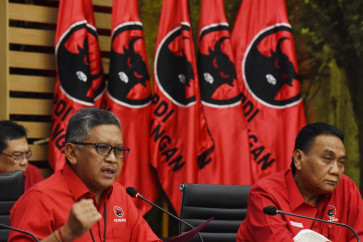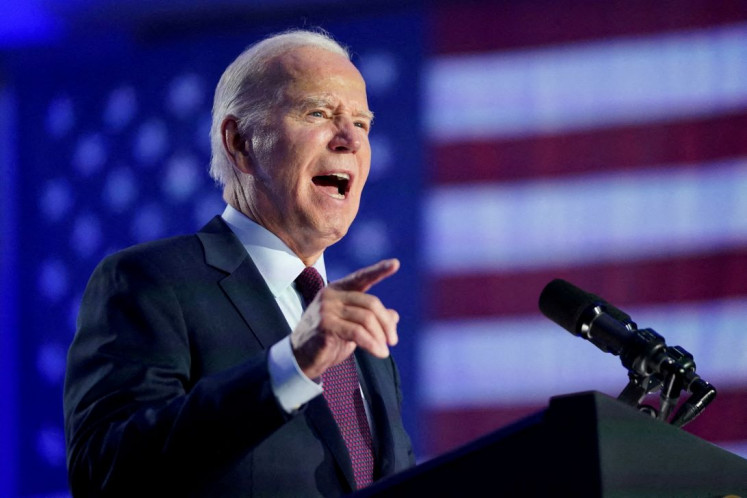Tourism players optimistic despite Jakarta attacks
Tourism industry players from major tourist destinations across the country have expressed optimism, claiming that the recent terrorist attacks in Jakarta were unlikely to have a significant impact on the sector as the latest reports have shown that the incident failed to discourage foreign tourists from visiting the country
Change Size

T
ourism industry players from major tourist destinations across the country have expressed optimism, claiming that the recent terrorist attacks in Jakarta were unlikely to have a significant impact on the sector as the latest reports have shown that the incident failed to discourage foreign tourists from visiting the country.
Speaking to The Jakarta Post on Saturday, Indonesian Hotel and Restaurant Association (PHRI) Bali chapter chairman Tjokorda Oka Artha Ardhana Sukawati said tourism activities in the country's most popular resort island were running as normal, with most hotels reporting that they had received no booking cancellations from overseas guests following Thursday's attack in the nation's capital.
'As of today [Saturday], the Jakarta attacks have had almost no impact on Bali tourism. I have checked with at least 30 hotels, chosen at random. Each of these confirmed that they had not experienced any [booking] cancellations,' said Cok Ace, as the businessman is affectionately called.
The latest data shows that 3.36 million foreign tourists visited Bali from January to October last year, a 7.62 percent increase from the 3.12 million foreign nationals who visited the island during the same period in 2014.
The data shows that the largest number of tourists arrived from Australia, representing a quarter of the island's tourism, followed by China, Japan, Malaysia and the United Kingdom. Cok Ace said the average hotel occupancy rate in Bali had remained stable at 50 percent over the past two weeks.
'January is considered low season for Bali tourism. So, the 50 percent [rate] is normal,' he said.
On Thursday morning, a bomb exploded inside a busy Starbucks coffee shop in downtown Jakarta, followed by a further attack on a small police post located at a busy intersection nearby. After the initial attacks, a gun battle ensued between the police and the suspected terrorists in the area surrounding these attacks.
Resulting in the deaths of two innocent civilians, an Indonesian and a Canadian, the attack also injured dozens of victims, including five police officers and four foreign citizens reported to have been from the Netherlands, Germany, Austria and Algeria. All five terrorist suspects were killed in the attack.
Bali Tourism Board chairman Ida Bagus Ngurah Wijaya said that law enforcement must immediately arrest the mastermind behind the attack so as to reassure the public that Indonesia is a safe place to visit.
'Police success in settling the case will help us regain trust from the international community,' he said.
In October 2002, a series of coordinated attacks in Kuta, Bali, orchestrated by the regional terrorist network Jamaah Islamiyah, led to the death of more than 200 people, including 88 Australians.
Three years later, another series of bomb attacks rocked the island, killing 20 people and injuring 100 others.
Meanwhile, in Yogyakarta, the province's PHRI chapter secretary, Deddy Pranowo Eryono, said that the bombings did not have a significant influence on local tourism because Jakarta, unlike Bali, is not the main entrance point for tourists visiting Yogyakarta.
'The Bali bombings, for example, triggered many trip cancelations to Yogyakarta,' he told the Post.
Last year, Yogyakarta received 281,000 foreign tourist visits, a 17 percent increase compared to 2014.
Similar optimism has also emerged in East Nusa Tenggara (NTT), where Komodo National Park is located.
Over the past few years, around 50,000 people a year, mostly foreigners, have flown to Labuan Bajo in West Manggarai regency, to visit the park, home to the region's endemic Komodo dragons.
'The police have stepped up security precautions at all airports in the province, including the one in Labuan Bajo, as the region has become the province's most popular tourist destination,' NTT Police spokesman Adj. Sr. Comr. Julens Abraham said.









